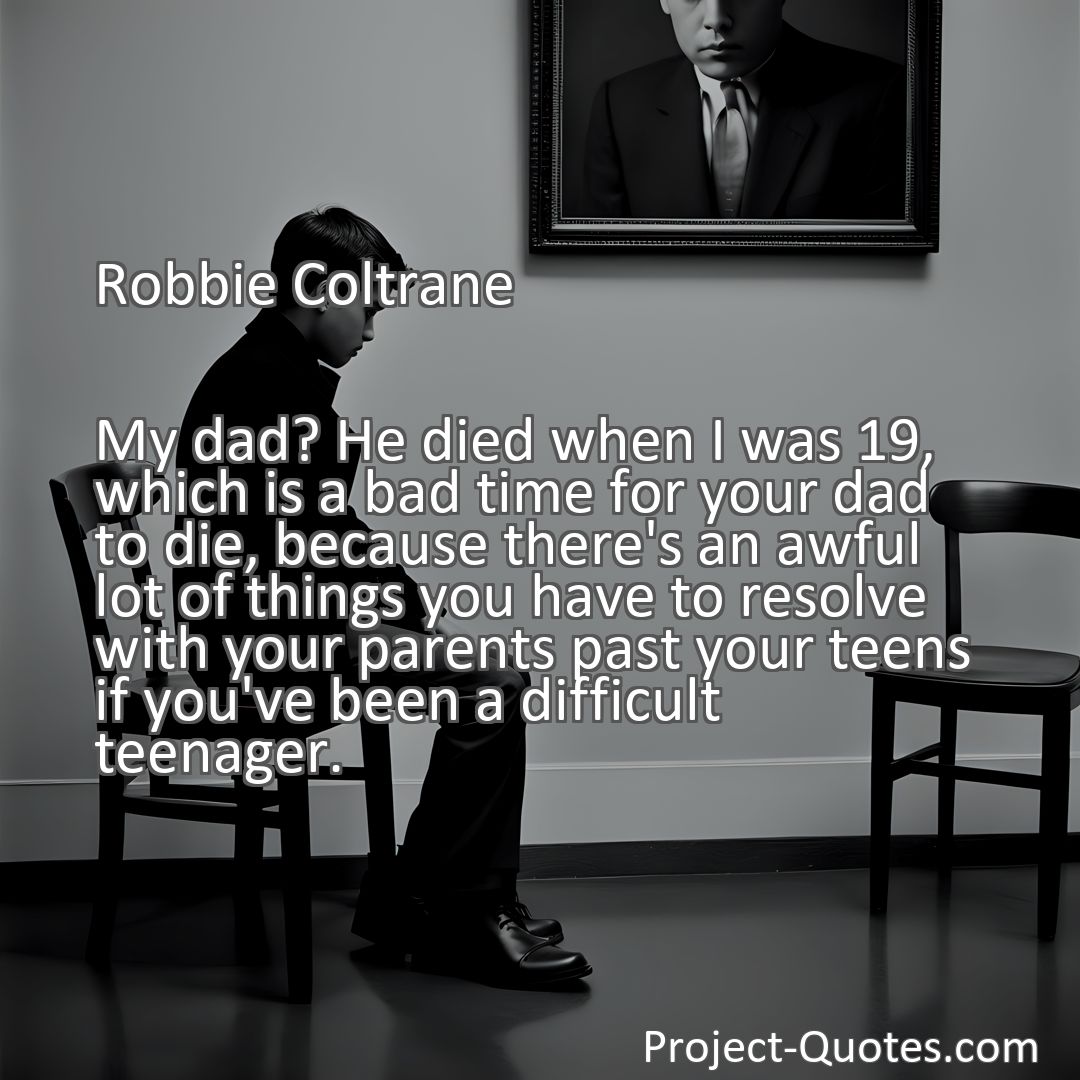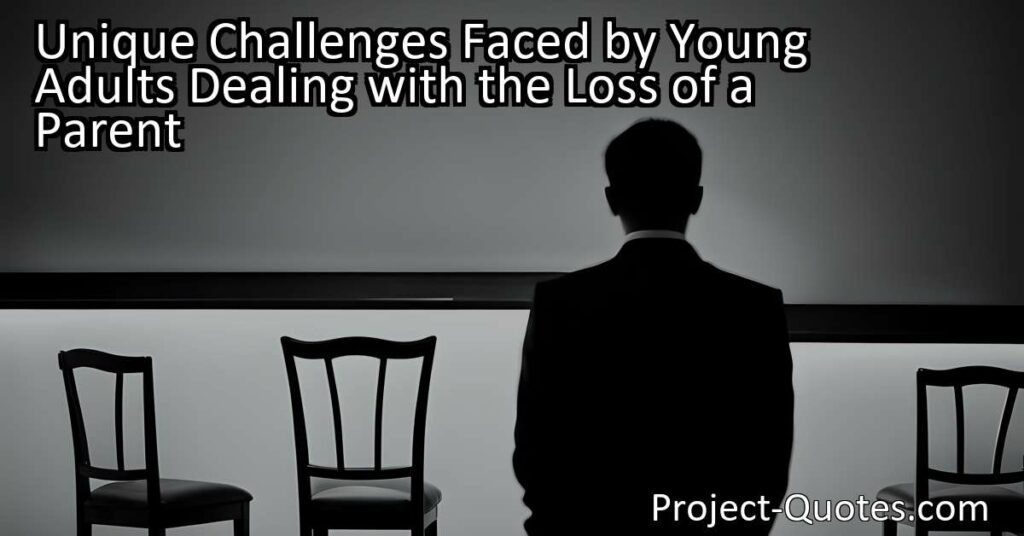My dad? He died when I was 19, which is a bad time for your dad to die, because there’s an awful lot of things you have to resolve with your parents past your teens if you’ve been a difficult teenager.
Robbie Coltrane
Unique Challenges Faced by Young Adults Dealing with the Loss of a ParentThe loss of a parent during the teenage years can complicate the resolution of conflicts and emotions, creating unique challenges for young adults. This tumultuous time of personal growth and self-discovery intersects with grief, making it difficult for adolescents to navigate their identities and emotions. However, with support from loved ones, therapy, and self-care practices, healing and growth are possible for young adults facing this difficult journey.
Table of Contents
- 1 My dad? He died when I was 19, which is a bad time for your dad to die, because there’s an awful lot of things you have to resolve with your parents past your teens if you’ve been a difficult teenager.
- 2 Robbie Coltrane
- 3 Meaning of Quote – My dad? He died when I was 19, which is a bad time for your dad to die, because there’s an awful lot of things you have to resolve with your parents past your teens if you’ve been a difficult teenager.
- 4 Freely Shareable Quote Image
- 5 Related
Meaning of Quote – My dad? He died when I was 19, which is a bad time for your dad to die, because there’s an awful lot of things you have to resolve with your parents past your teens if you’ve been a difficult teenager.
Growing up can be a challenging and tumultuous journey, especially when it comes to the complex dynamics between teenagers and their parents. Robbie Coltrane, a renowned actor and comedian, once shared a deeply personal perspective on the untimely death of his father. Reflecting upon the impact it had on his life, Coltrane acknowledged that losing a parent during the formative years of adolescence can complicate the process of resolving issues that arise between parents and children during the teenage years.
Coltrane’s words resonate with many individuals who have experienced the loss of a parent at a young age. Death is an inevitable part of life, but its timing can significantly influence how it shapes one’s emotional well-being. Losing a parent during the transition from teenager to young adult presents unique challenges as it intersects with a crucial period of personal growth and self-discovery.
During adolescence, young people often find themselves grappling with myriad emotions and attempting to navigate their identities. This tumultuous phase is typically marked by rebellion and defiance, as teenagers strive to assert their independence and forge their paths in life. Conflict between parents and teenagers is almost inevitable, and these clashes can further complicate the grieving process when a parent passes away.
When a parent dies during this critical time, unresolved issues often haunt the remaining teenager. Whether it be unspoken apologies, strained relationships, or lingering resentments, these unsettled matters can leave an indelible mark on one’s personal growth and psychological well-being. Coltrane’s words capture a sense of lament for the missed opportunity to resolve these issues with his father, leaving him with a sense of unfulfilled closure.
Furthermore, the experience of grief itself can be incredibly overwhelming for any individual, let alone a teenager. Processing emotions during this period of life can be particularly challenging, as adolescents may not yet possess the emotional maturity or coping mechanisms to handle such a profound loss. The absence of a parent during this time can contribute to feelings of isolation and heightened vulnerability, making it crucial for young people to receive adequate support from other family members, friends, or professionals.
The consequences of losing a parent during adolescence often extend beyond the immediate emotional impact. It can potentially disrupt educational aspirations, hinder social development, and influence future relationships. The burden of unresolved issues and grief may manifest as academic struggles, behavioral changes, or difficulties in building healthy connections with peers and mentors. Thus, the loss of a parent during this transformational period can have long-lasting effects on various aspects of an individual’s life.
Nevertheless, despite the challenging circumstances, it is essential to recognize that healing and growth are possible. Time, the support of loved ones, and self-reflection can play instrumental roles in the process of resolution and eventual acceptance. While the opportunity for reconciliation with a deceased parent may be lost forever, finding peace within oneself and learning to cope with the emotional aftermath is a feasible goal.
In many cases, seeking professional help can be immensely beneficial. Therapists, psychologists, or grief counselors can provide a safe and nurturing environment where adolescents can express their emotions, navigate their grief, and address any unresolved matters. Through therapy, individuals can learn coping strategies, develop healthier communication patterns, and gain insights into their own emotions and behaviors.
Additionally, finding solace in connections with other supportive figures is paramount. Friends, extended family members, or mentor figures can provide the emotional support necessary for adolescents to work through their grief and navigate the challenges they face. Surrounding oneself with a compassionate and understanding network can help alleviate feelings of isolation and foster a sense of belonging.
Moreover, engaging in self-care practices is vital on the journey towards resolution. Engaging in activities that promote emotional well-being, such as journaling, exercising, or pursuing creative outlets, can aid in the processing of grief. These activities can serve as healthy outlets for emotions, allowing adolescents to channel their feelings into productive and constructive means.
It is important for teenagers who have experienced the loss of a parent during their formative years to remember that they are not alone in their struggles. Countless others have faced similar circumstances and have navigated their way towards healing and growth. Stories of resilience and personal triumph can inspire and serve as guiding lights through the darkness, reminding individuals that there is hope for a brighter future.
Robbie Coltrane’s poignant quote sheds light on a profound and relatable experience that many young people face. The untimely death of a parent during the teenage years can hinder the resolution of conflicts and repressed emotions, creating a unique set of challenges for those left behind. However, with time, support, and self-reflection, healing and growth become achievable goals. By acknowledging the complexities of this journey, offering support to one another, and fostering a network of understanding individuals, we can create a compassionate and empathetic society that embraces the struggles faced by young individuals dealing with the loss of a parent during adolescence.
I hope this quote inspired image brings you hope and peace. Share it with someone who needs it today!


